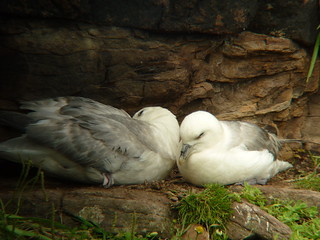Study: More Than 90 Percent of Dead Pacific Northwest Seabirds in Pacific Northwest Had Ingested Plastic
There is great concern about the impacts of plastics on marine wildlife in the Pacific, but much of the focus has been in tropical regions like the Northwestern Hawaiian Islands. A new study in Marine Pollution Bulletin and reported by Discovery News shows that plastics are impacting seabird populations in the Pacific Northwest as well, a region that researchers have compared to the highly-polluted North Sea with respect to plastic pollution.
For the study, scientists cut open the stomachs of 67 northern fulmars, a type of seabird, which had died and been beached on the coasts of British Columbia, Washington and Oregon. Fulmars are particularly good for this kind of study because they eat only in the water, they eat over a wide migratory range, and their tastes are not discriminating, making them prone to swallowing plastic if it’s there.
Ninety-six percent of the plastic came from everyday consumer objects, including twine, rope, fishing line, Styrofoam, bottle caps and candy wrappers. The other 4 percent were industrial pellets.
Nearly 93 percent of the birds harbored plastic in their stomachs, the research team reported in the journal Marine Pollution Bulletin. And each bird contained an average of nearly 37 pieces of plastic. One bird had 454 pieces in its stomach.
…More at Pacific NW Seabirds Stuffed Full of Plastic (Discovery)
University of British Columbia zoology graduate student Stephanie Avery-Gomm, a researcher on the study, stated:
“Despite the close proximity of the Great Pacific Garbage Patch-an area of concentrated plastic pollution in the middle of the North Pacific gyre- plastic pollution has not been considered an issue of concern off our coast,” Avery-Gomm says through a recent media release. “But we’ve found similar amounts and incident rates of plastic in beached northern fulmars here as those in the North Sea. This indicates it is an issue which warrants further study.” …More at Canada.com







Leave a Reply
Want to join the discussion?Feel free to contribute!